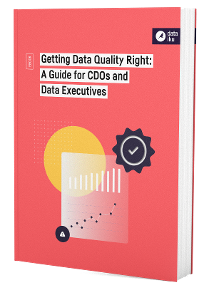“Fortune 1000 retailers were among the earliest and most aggressive backers of artificial intelligence (AI), especially with the arrival of e-commerce and, particularly, online pricing. Yet retailers have been hesitant to fully embrace AI deployments in many other areas of their business for a wide range of reasons, including underlying data inaccuracies, operational disruptions, and even perceptions of privacy issues.”
This statement in Harvard Business Review’s “Reshaping the Retail Industry Paradigm Through AI” white paper nicely summarizes the state of play when it comes to AI in retail. The industry is home to some of AI’s fiercest early adopters, but there remains massive untapped potential for retailers to harness AI-backed technology in order to drive benefits such as increased profit margins, competitive differentiation, reduced supply chain costs, and stronger personalization (which leads to a stronger overall customer experience).
So, how can retail, CPG, and e-commerce brands — notably, data or analytics team managers and executives, both from centers of excellence and the different lines of business — surpass (or simply catch up with) the early movers? We’ve compiled some key recommendations below.
From Theory to Practice: Capitalizing on AI in Retail
1. From inventory to point of sale, easily compile your data in one place.
 As retailers, the troves of data you have access to — sales, inventory, operational, consumer, and more – is significant. But how do you keep it centralized and accessible to make insights generation hassle free? The answer lies in having a platform (like Dataiku) that integrates customer data and enables advanced analytics under the same roof. Don’t let the multiplicity of sources be a blocker, but rather a competitive advantage for driving data-backed insights and predictions.
As retailers, the troves of data you have access to — sales, inventory, operational, consumer, and more – is significant. But how do you keep it centralized and accessible to make insights generation hassle free? The answer lies in having a platform (like Dataiku) that integrates customer data and enables advanced analytics under the same roof. Don’t let the multiplicity of sources be a blocker, but rather a competitive advantage for driving data-backed insights and predictions.
Related, data quality is a major factor in delivering personalized customer experiences, so if the data is not sound, hyper-personalization at scale runs the risk of problems (i.e., frustrated customers receiving irrelevant promotions to decrease marketing ROI). With a tool like Dataiku, accessing data outside of domains will be simplified, while governed — there’s no need to download, copy, or store datasets locally (which is a data quality win).
A common misconception is that retailers need to get the company's data right before embarking on AI projects. Not only does this mindset lead to years and millions of dollars lost since data is only contextual to its use, but delaying these efforts to get data quality right is not really an option — making data fit for purpose needs to be part of the transformation journey itself.
2. Get more people involved in the AI transformation.
At Dataiku, we firmly believe that — in order for analytics and AI projects to be successful — the entire organization needs to be enabled to work with data. From in-store associates and supply chain managers to marketing and business analysts, equipping everyone with a common ground to work on projects together is advantageous as it promotes a culture of collaboration and reuse while also preventing duplicate work.

3. Secure your brand reputation with built-in privacy capabilities.
Consumer privacy is reshaping the retail, CPG, and e-commerce space at large and the list of global and state privacy regulations is ever evolving. With Dataiku, you protect and preserve your brand reputation while scaling your data and AI projects. Dataiku provides custom policy capabilities to document personal data, configure project-level forbidden actions, and generate trusted reports in relation to GDPR, CCPA, and other privacy regulations.
Go From Weeks to Hours With 7 Ready-to-Deploy Use Cases for AI in Retail
To maximize impact with AI in retail, Dataiku provides a retail accelerator pack to help teams build concrete analytics and AI use cases with minimum time and resources, but maximum business results. These seven, prepackaged, ready-out-of-the-box use cases enable accelerated AI efforts, plus the power of the full Dataiku platform to expand beyond the basics and build long-term AI impact.
What products will be best-sellers in three months? To which areas should products be shipped and in what quantities? Answer these questions and more with the Demand Forecasting solution from Dataiku. Non-data scientists can quickly generate the appropriate machine learning (ML) model for different forecasting scenarios using transaction datasets, product metadata, point of sale information, seasonal event data, and more.
A leading dairy cooperative needed to forecast sales on 430 products sold in nine regions (for each product in each region) in monthly buckets. The central data science team wanted to replace long, repetitive, and manual tasks done by multiple employees in spreadsheets and refine their forecasts with an ML-driven approach. With the Dataiku Demand Forecasting solution, the team was able to fast-track to value — it took one day for full solution implementation and one hour (versus one week) to forecast sales monthly.
2. RFM-Enriched Customer Lifetime Value
With this solution, anyone — including marketers with the power to take action via targeted campaigns — can deep dive into purchase history at scale to predict customer lifetime value across different dimensions. Today, a leading telecommunications company based in Asia uses the Dataiku RFM-Enriched Customer Lifetime Value Solution to refine its customer engagement strategies.
Receive ML-based recommendations to push the right product to the right consumer. Teams can push recommendations to users en masse through on-site personalization or marketing campaigns or explore user-item relationships in-depth with ready-to-use dashboards.
With the Market Basket Analysis solution, teams have a structured way to dig into the data and identify products central to baskets and frequent basket combinations. Plus, there’s a clear path forward to building AI-powered, personalized experiences.
“This solution allowed us to accelerate topics that simply could not fit into our busy roadmap. The implementation took only a few hours, and we are now ready to launch a marketing campaign powered by Dataiku Market Basket Analysis.”
- Ben Powis, Head of Data Science, MandM Direct
According to Accenture, 91% of customers are more likely to shop with brands that recognize, remember, and personalize their journey. With Dataiku’s RFM-Based Segmentation solution, teams can explore their customer base and leverage ML techniques to group customers, in an easy, visual interface.
6. Customer Satisfaction Reviews
Everyone knows that listening to customers is important, but doing so at scale is easier said than done — that’s where ML (and deep learning) can help. The Customer Satisfaction Reviews solution does all the heavy lifting so teams can get meaningful customer insights, from the basics to more advanced analysis.
7. Distribution Spatial Footprint
Today more than ever, it’s critical to stay on top of questions of coverage and competitive positioning. With the Distribution Spatial Footprint solution, teams can input points of sales and customer locations and Dataiku outputs a visual representation of your distribution network to understand footprint and build strategies.





